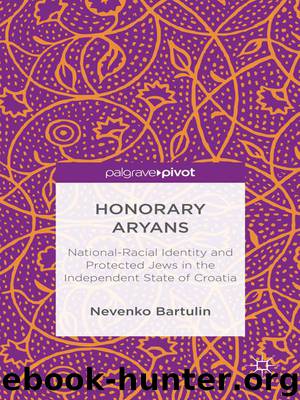Honorary Aryans: National-Racial Identity and Protected Jews in the Independent State of Croatia (Palgrave Pivot) by Nevenko Bartulin

Author:Nevenko Bartulin [Bartulin, Nevenko]
Language: eng
Format: epub
ISBN: 9781137339133
Publisher: Palgrave Macmillan
Published: 2013-07-04T00:00:00+00:00
Ustasha ideas on Croatian ethnic–racial identity
The lawyer and former secretary of the Croatian Party of Right (the successor to Josip Frank‘s Pure Party of Right), Ante Pavelić, founded the Ustasha Organisation (from 1933, ‘Movement’) in 1930 in Italy, where he enjoyed the sanctuary of the Fascist government of Benito Mussolini, which pursued a foreign policy in the Balkans generally hostile to the Yugoslav state. The Ustasha movement aimed to liberate Croatia from Serbian rule ‘with all means’, in order to establish an independent state on the whole of its ‘ethnic and historic territory’. The central Ustasha ideas on nation and state were laid out in the central ideological document issued by Pavelić in 1933, known as ‘The Principles of the Ustasha Movement’.59
The Ustasha Principles were based on two central concepts: the ethnic individuality of the Croatian nation and Croatian historic state right. The first principle stated unambiguously: ‘the Croatian nation [narod] is a self-contained ethnic unit, it is a nation in its own right and from an ethnic perspective is not identical with any other nation nor is it a part of, or a tribe of, any other nation’.60 Principles five and six stated that the Croats arrived in their current homeland, which they ‘conquered’, as a ‘completely free’ and ‘completely organised’ people, in both a ‘military’ and ‘familial’ sense. Principle seven stated that the Croats maintained their state ‘throughout the centuries up until the end of the [first] world war’, and they therefore have the right to restore ‘their own completely free and independent Croatian state’ (no. 8).61 Furthermore, ‘no one who is not by descent and blood a member of the Croatian nation can decide on Croatian state and national matters in an independent Croatian state’ (no. 11); and ‘in Croatia he who does not originate from a peasant family is, in ninety-nine cases out of a hundred, not of Croatian descent or blood but a foreign settler’ (no. 13).62
As Holm Sundhaussen concisely notes, the document expressed the idea that the Croats were ‘a god-given, immortal blood community, which conquered its settled areas 1400 years ago’ and therefore ‘had acquired inalienable territorial rights’.63 He fails, however, to point out that the Ustashe wished to prove that the Croats were a separate ethnolinguistic nation, and that is why there are several references in the Ustasha Principles to ‘ethnicity’, ‘blood’, ‘descent’, ‘family’ and ‘foreign settlers’. In 1935 a leading Ustasha by the name of Ante Valenta published a booklet in which he explained the Ustasha Principles in more detail. With regard to principle number eleven Valenta argued that foreigners in a Croatian state would enjoy ‘all rights to life’, but they would be excluded from having any influence on ‘the fate of Croatia’, even if their ancestors had settled in Croatia many generations ago.64 Therefore, only the descendants of those foreigners who had thoroughly assimilated into the Croatian nation through intermarriage (thus acquiring Croatian ‘spirit’ and ‘blood’) were to be considered equal to native Croats in the future independent Croatian state.
Download
This site does not store any files on its server. We only index and link to content provided by other sites. Please contact the content providers to delete copyright contents if any and email us, we'll remove relevant links or contents immediately.
The Vikings: Conquering England, France, and Ireland by Wernick Robert(79224)
Ali Pasha, Lion of Ioannina by Eugenia Russell & Eugenia Russell(39942)
The Vikings: Discoverers of a New World by Wernick Robert(36831)
The Conquerors (The Winning of America Series Book 3) by Eckert Allan W(36716)
Cecilia; Or, Memoirs of an Heiress — Volume 1 by Fanny Burney(32094)
Cecilia; Or, Memoirs of an Heiress — Volume 3 by Fanny Burney(31482)
Cecilia; Or, Memoirs of an Heiress — Volume 2 by Fanny Burney(31436)
Empire of the Sikhs by Patwant Singh(22780)
Hans Sturm: A Soldier's Odyssey on the Eastern Front by Gordon Williamson(18341)
The Secret History by Donna Tartt(18269)
Cat's cradle by Kurt Vonnegut(14806)
Sapiens: A Brief History of Humankind by Yuval Noah Harari(14006)
Pimp by Iceberg Slim(13828)
Talking to Strangers by Malcolm Gladwell(12916)
Norse Mythology by Gaiman Neil(12880)
Leonardo da Vinci by Walter Isaacson(12834)
Underground: A Human History of the Worlds Beneath Our Feet by Will Hunt(11857)
4 3 2 1: A Novel by Paul Auster(11843)
The Radium Girls by Kate Moore(11652)
